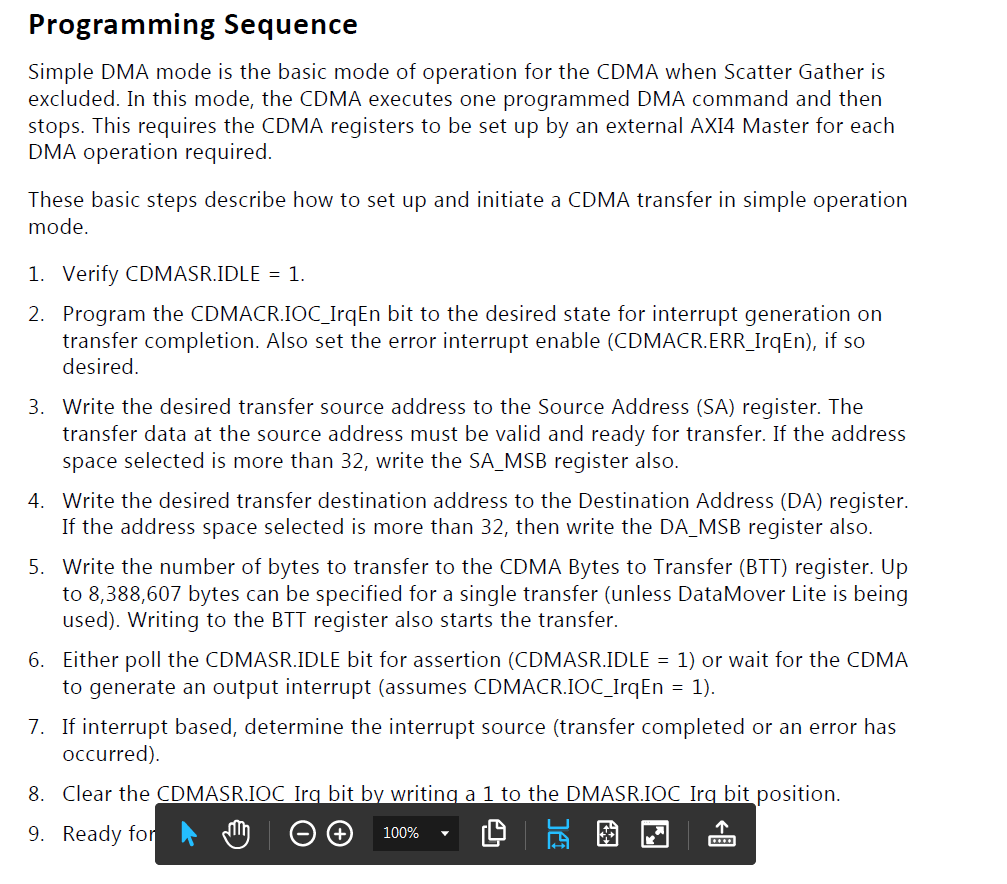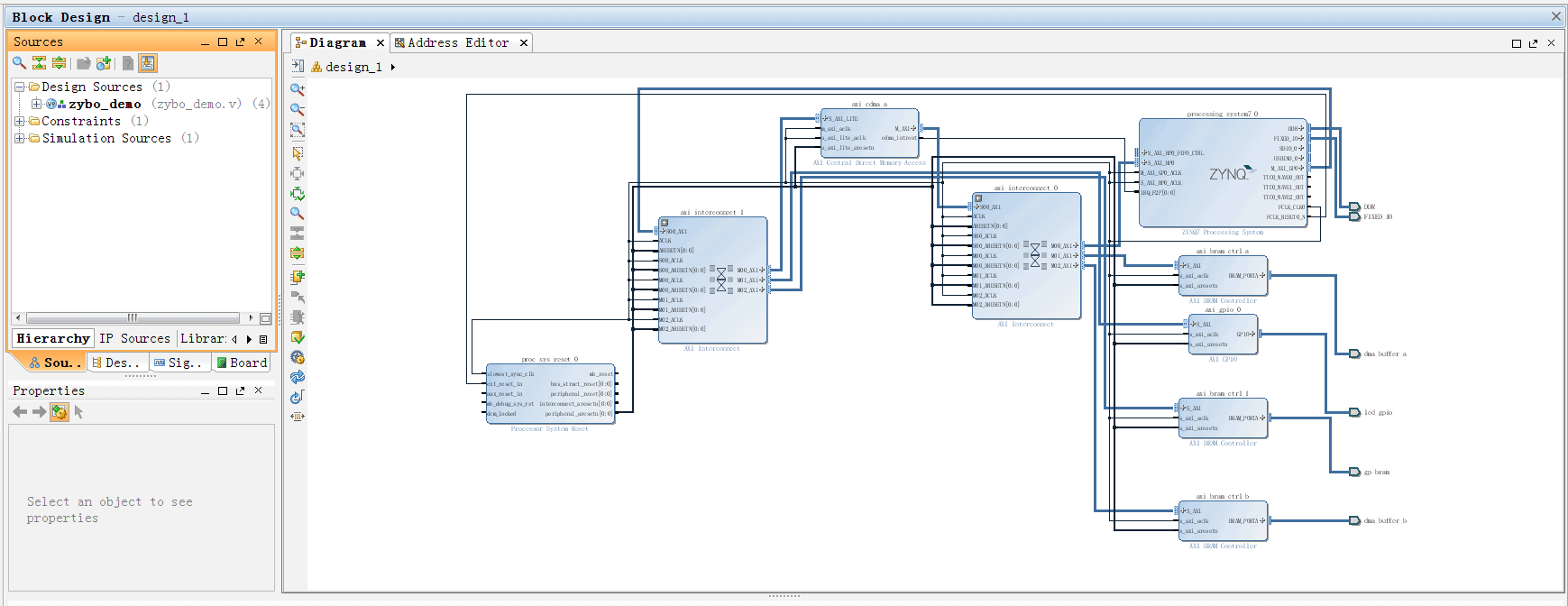[原创]Zynq AXI-CDMA的使用
Xilinx 提供了3种DMA
- AXI-DMA
- AXI-CDMA
- AXI-VDMA
使用CDMA能够满足项目需求(MM-MM),DS文档介绍如下:
The Xilinx LogiCORE™ IP AXI Central Direct Memory Access (CDMA) core is a soft Xilinx Intellectual Property (IP) core for use with the Vivado® Design Suite. The AXI CDMA provides high-bandwidth Direct Memory Access (DMA) between a memory-mapped source address and a memory-mapped destination address using the AXI4 protocol. An optional Scatter Gather (SG) feature can be used to offload control and sequencing tasks from the system CPU. Initialization, status, and control registers are accessed through an AXI4-Lite slave interface, suitable for the Xilinx MicroBlaze™ processor.

BD连接如下:

Standalone APP代码
#include "xparameters.h"
#include <stdio.h>
#include "xaxicdma.h"
#include "xil_cache.h"
#include "xscutimer.h"
#define TIMER_LOAD_VALUE 0xFFFFFFFF
#define BRAM_GP0_ADDR 0x40000000
XAxiCdma_Config *axi_cdma_cfg;
XAxiCdma axi_cdma;
#define PS_OCM_Addr 0x10000000 // some address in OCM
#define PL_BRAM_Addr 0xC0000000 // Not 'seen' by the PS
//#define BUFF_LEN 16*4
//16384*32bit/8=65536Byte
//32768*32bit/8=131072Byte
#define BUFF_LEN 131072
XScuTimer Timer;
void hs_timer(void)
{
int Status;
XScuTimer_Config *ConfigPtr;
XScuTimer *TimerInstancePtr=&Timer;
/*
* Initialize the Scu Private Timer so that it is ready to use.
*/
ConfigPtr = XScuTimer_LookupConfig(XPAR_PS7_SCUTIMER_0_DEVICE_ID);
/*
* This is where the virtual address would be used, this example
* uses physical address.
*/
Status = XScuTimer_CfgInitialize(TimerInstancePtr, ConfigPtr, ConfigPtr->BaseAddr);
if (Status != XST_SUCCESS) {
return XST_FAILURE;
}
else
xil_printf("XScuTimer_CfgInitialize OK\n\r");
}
int main()
{
xil_printf("%c[2J",27);
int i,k;
int Status;
volatile int CntValue1,CntValue2;
u32 *Saddr2 = (u32 *)0x02000000;
u32 *rx_buffer = (u32 *) PS_OCM_Addr;
u32 *tx_buffer = (u32 *) PL_BRAM_Addr;
u32 *rd_ram = (u32 *) BRAM_GP0_ADDR;
hs_timer() ;
xil_printf("-----------------------*-----------------------\n\r");
xil_printf("-Simple DMA demo based on Zybo board -\n\r");
xil_printf("-write some data to DDR -\n\r");
xil_printf("-move those data to bram and read it from GP0 -\n\r");
xil_printf("-----------------------*-----------------------\n\r");
// Set up the AXI CDMA
printf("--Set up the AXI CDMA\n\r");
axi_cdma_cfg = XAxiCdma_LookupConfig(XPAR_AXICDMA_0_DEVICE_ID);
if (!axi_cdma_cfg) {
printf("AXAxiCdma_LookupConfig failed\n\r");
}
Status = XAxiCdma_CfgInitialize(&axi_cdma, axi_cdma_cfg, axi_cdma_cfg->BaseAddress);
if (Status == XST_SUCCESS ){
printf("XAxiCdma_CfgInitialize succeed\n\r");
}
printf("--Disable Interrupt of AXI CDMA\n\r");
XAxiCdma_IntrDisable(&axi_cdma, XAXICDMA_XR_IRQ_ALL_MASK);
if (XAxiCdma_IsBusy(&axi_cdma)) {
printf("AXI CDMA is busy...\n\r");
while (XAxiCdma_IsBusy(&axi_cdma));
}
Xil_DCacheFlush();
XScuTimer_LoadTimer(&Timer, TIMER_LOAD_VALUE);
CntValue1 = XScuTimer_GetCounterValue(&Timer);
XScuTimer_Start(&Timer);
Status = XAxiCdma_SimpleTransfer(
&axi_cdma,
(u32) tx_buffer,
(u32) rx_buffer,
BUFF_LEN,
NULL,
NULL);
Xil_DCacheFlush();
CntValue2 = XScuTimer_GetCounterValue(&Timer);
XScuTimer_Stop(&Timer);
printf("DMA Move 32768*32bit Total Time: %d us\n\r", (CntValue1-CntValue2)*3/1000);
// Wait until core isn't busy
if (XAxiCdma_IsBusy(&axi_cdma)) {
printf("AXI CDMA is busy...\n\r");
while (XAxiCdma_IsBusy(&axi_cdma));
}
Xil_DCacheInvalidateRange((u32)PS_OCM_Addr, BUFF_LEN);
for(i=0; i<4; i++)
//for(i=0; i<BUFF_LEN/4; i++)
{
k = *(rx_buffer + i);
xil_printf("The DMA read from address = %2d, the read value = %8x-----------------------\n\r",i,k);
xil_printf("The DMA read from address = %2d, the MSB read value = %8d-----------------------\n\r",i,k >> 16);
xil_printf("The DMA read from address = %2d, the LSB read value = %8d-----------------------\n\n\n\r",i,k & 0x0000FFFF);
}
for(i=32764; i<=32767; i++)
//for(i=0; i<BUFF_LEN/4; i++)
{
k = *(rx_buffer + i);
xil_printf("The DMA read from address = %2d, the read value = %8x-----------------------\n\r",i,k);
xil_printf("The DMA read from address = %2d, the MSB read value = %8d-----------------------\n\r",i,k >> 16);
xil_printf("The DMA read from address = %2d, the LSB read value = %8d-----------------------\n\n\n\r",i,k & 0x0000FFFF);
}
return 0;
}
Linux APP代码
#include <unistd.h>
#include <stdio.h>
#include <stdlib.h>
#include <string.h>
#include <fcntl.h>
#include <sys/mman.h>
#include <sys/time.h>
#define CDMA_BASE_ADDRESS 0x7E200000
#define GPIO_DATA_OFFSET 0
#define GPIO_DIRECTION_OFFSET 4
#define PL_BRAM_SRC_ADDRESS 0xC0000000
#define DDR_BASE_ADDRESS 0x10000000
#define DDR_BASE_WRITE_ADDRESS 0x10000000
#define XGPIO_CHAN_OFFSET 8
#define XAXICDMA_CR_OFFSET 0x00000000 /**< Control register */
#define XAXICDMA_SR_OFFSET 0x00000004 /**< Status register */
#define XAXICDMA_CDESC_OFFSET 0x00000008 /**< Current descriptor pointer */
#define XAXICDMA_TDESC_OFFSET 0x00000010 /**< Tail descriptor pointer */
#define XAXICDMA_SRCADDR_OFFSET 0x00000018 /**< Source address register */
#define XAXICDMA_DSTADDR_OFFSET 0x00000020 /**< Destination address register */
#define XAXICDMA_BTT_OFFSET 0x00000028 /**< Bytes to transfer */
/** @name Bitmasks of XAXICDMA_CR_OFFSET register
* @{
*/
#define XAXICDMA_CR_RESET_MASK 0x00000004 /**< Reset DMA engine */
#define XAXICDMA_CR_SGMODE_MASK 0x00000008 /**< Scatter gather mode */
/** @name Bitmask for interrupts
* These masks are shared by XAXICDMA_CR_OFFSET register and
* XAXICDMA_SR_OFFSET register
* @{
*/
#define XAXICDMA_XR_IRQ_IOC_MASK 0x00001000 /**< Completion interrupt */
#define XAXICDMA_XR_IRQ_DELAY_MASK 0x00002000 /**< Delay interrupt */
#define XAXICDMA_XR_IRQ_ERROR_MASK 0x00004000 /**< Error interrupt */
#define XAXICDMA_XR_IRQ_ALL_MASK 0x00007000 /**< All interrupts */
#define XAXICDMA_XR_IRQ_SIMPLE_ALL_MASK 0x00005000 /**< All interrupts for
simple only mode */
/*@}*/
/** @name Bitmasks of XAXICDMA_SR_OFFSET register
* This register reports status of a DMA channel, including
* idle state, errors, and interrupts
* @{
*/
#define XAXICDMA_SR_IDLE_MASK 0x00000002 /**< DMA channel idle */
#define XAXICDMA_SR_SGINCLD_MASK 0x00000008 /**< Hybrid build */
#define XAXICDMA_SR_ERR_INTERNAL_MASK 0x00000010 /**< Datamover internal err */
#define XAXICDMA_SR_ERR_SLAVE_MASK 0x00000020 /**< Datamover slave err */
#define XAXICDMA_SR_ERR_DECODE_MASK 0x00000040 /**< Datamover decode err */
#define XAXICDMA_SR_ERR_SG_INT_MASK 0x00000100 /**< SG internal err */
#define XAXICDMA_SR_ERR_SG_SLV_MASK 0x00000200 /**< SG slave err */
#define XAXICDMA_SR_ERR_SG_DEC_MASK 0x00000400 /**< SG decode err */
#define XAXICDMA_SR_ERR_ALL_MASK 0x00000770 /**< All errors */
/*@}*/
#define MAP_SIZE 4096UL
#define MAP_MASK (MAP_SIZE - 1)
#define DDR_MAP_SIZE 0x00100000
#define DDR_MAP_MASK (DDR_MAP_SIZE - 1)
#define DDR_WRITE_OFFSET 0x10000000
#define BUFFER_BYTESIZE 32768 // Length of the buffers for DMA transfer
long times = 0; // us
double dbTotalTimes = 0.0; // s
long nReadTotal = 0;
struct timeval timeStart, timeEnd;
int main()
{
int memfd;
void *mapped_base, *mapped_dev_base;
off_t dev_base = CDMA_BASE_ADDRESS;
int memfd_2;
void *mapped_base_2, *mapped_dev_base_2;
off_t dev_base_2 = DDR_BASE_WRITE_ADDRESS;
unsigned int TimeOut =5;
unsigned int ResetMask;
unsigned int RegValue;
unsigned int DestArray[BUFFER_BYTESIZE ];
unsigned int Index;
for (Index = 0; Index < (BUFFER_BYTESIZE/2); Index++)
{
DestArray[Index] = 0x12345678+Index;
}
memfd = open("/dev/mem", O_RDWR | O_SYNC);
if (memfd == -1)
{
printf("Can't open /dev/mem.\n");
exit(0);
}
printf("/dev/mem opened.\n");
// Map one page of memory into user space such that the device is in that page, but it may not
// be at the start of the page.
mapped_base = mmap(0, MAP_SIZE, PROT_READ | PROT_WRITE, MAP_SHARED, memfd, dev_base & ~MAP_MASK);
if (mapped_base == (void *) -1)
{
printf("Can't map the memory to user space.\n");
exit(0);
}
// get the address of the device in user space which will be an offset from the base
// that was mapped as memory is mapped at the start of a page
mapped_dev_base = mapped_base + (dev_base & MAP_MASK);
//Reset CDMA
do{
ResetMask = (unsigned long )XAXICDMA_CR_RESET_MASK;
*((volatile unsigned long *) (mapped_dev_base + XAXICDMA_CR_OFFSET)) = (unsigned long)ResetMask;
/* If the reset bit is still high, then reset is not done */
ResetMask = *((volatile unsigned long *) (mapped_dev_base + XAXICDMA_CR_OFFSET));
if(!(ResetMask & XAXICDMA_CR_RESET_MASK))
{
break;
}
TimeOut -= 1;
}while (TimeOut);
//enable Interrupt
RegValue = *((volatile unsigned long *) (mapped_dev_base + XAXICDMA_CR_OFFSET));
RegValue = (unsigned long)(RegValue | XAXICDMA_XR_IRQ_ALL_MASK );
*((volatile unsigned long *) (mapped_dev_base + XAXICDMA_CR_OFFSET)) = (unsigned long)RegValue;
// Checking for the Bus Idle
RegValue = *((volatile unsigned long *) (mapped_dev_base + XAXICDMA_SR_OFFSET));
if(!(RegValue & XAXICDMA_SR_IDLE_MASK))
{
printf("BUS IS BUSY Error Condition \n\r");
return 1;
}
// Check the DMA Mode and switch it to simple mode
RegValue = *((volatile unsigned long *) (mapped_dev_base + XAXICDMA_CR_OFFSET));
if((RegValue & XAXICDMA_CR_SGMODE_MASK))
{
RegValue = (unsigned long)(RegValue & (~XAXICDMA_CR_SGMODE_MASK));
printf("Reading \n \r");
*((volatile unsigned long *) (mapped_dev_base + XAXICDMA_CR_OFFSET)) = (unsigned long)RegValue ;
}
//Set the Source Address
*((volatile unsigned long *) (mapped_dev_base + XAXICDMA_SRCADDR_OFFSET)) = (unsigned long)PL_BRAM_SRC_ADDRESS;
//Set the Destination Address
*((volatile unsigned long *) (mapped_dev_base + XAXICDMA_DSTADDR_OFFSET)) = (unsigned long)DDR_BASE_WRITE_ADDRESS;
RegValue = (unsigned long)(BUFFER_BYTESIZE);
// write Byte to Transfer
*((volatile unsigned long *) (mapped_dev_base + XAXICDMA_BTT_OFFSET)) = (unsigned long)RegValue;
/*======================================================================================
STEP 6 : Wait for the DMA transfer Status
========================================================================================*/
gettimeofday(&timeStart, NULL);
do
{
RegValue = *((volatile unsigned long *) (mapped_dev_base + XAXICDMA_SR_OFFSET));
}while(!(RegValue & XAXICDMA_XR_IRQ_ALL_MASK));
gettimeofday(&timeEnd, NULL);
times = 1000000*(timeEnd.tv_sec - timeStart.tv_sec) + timeEnd.tv_usec - timeStart.tv_usec;
if(BUFFER_BYTESIZE == 32768)
printf("Read 32 Lines * 512 Dots :\n\r");
else
printf("Read 128 Lines * 512 Dots :\n\r");
printf("Xilinx AXI-CDMA Read %d Byte = %d us \n", BUFFER_BYTESIZE,times);
if((RegValue & XAXICDMA_XR_IRQ_IOC_MASK))
{
printf("Transfer Completed \n\r ");
}
if((RegValue & XAXICDMA_XR_IRQ_DELAY_MASK))
{
printf("IRQ Delay Interrupt\n\r ");
}
if((RegValue & XAXICDMA_XR_IRQ_ERROR_MASK))
{
printf("Transfer Error Interrupt\n\r ");
}
/*======================================================================================
STEP 7 : Un-map the AXI CDMA memory from the User layer.
========================================================================================*/
if (munmap(mapped_base, MAP_SIZE) == -1)
{
printf("Can't unmap memory from user space.\n");
exit(0);
}
close(memfd);
/*======================================================================================
STEP 8 : Map the kernel memory location starting from 0x30000000 to the User layer
========================================================================================*/
memfd_2 = open("/dev/mem", O_RDWR | O_SYNC);
if (memfd_2 == -1)
{
printf("Can't open /dev/mem.\n");
exit(0);
}
printf("/dev/mem opened.\n");
// Map one page of memory into user space such that the device is in that page, but it may not
// be at the start of the page.
mapped_base_2 = mmap(0, DDR_MAP_SIZE, PROT_READ | PROT_WRITE, MAP_SHARED, memfd_2, dev_base_2 & ~DDR_MAP_MASK);
if (mapped_base_2 == (void *) -1)
{
printf("Can't map the memory to user space.\n");
exit(0);
}
printf("Memory mapped at address %p.\n", mapped_base_2);
// get the address of the device in user space which will be an offset from the base
// that was mapped as memory is mapped at the start of a page
mapped_dev_base_2 = mapped_base_2 + (dev_base_2 & DDR_MAP_MASK);
/*======================================================================================
STEP 9 : Copy the Data from DDR Memory location 0x20000000 to Destination Buffer
========================================================================================*/
memcpy(DestArray, mapped_dev_base_2, (BUFFER_BYTESIZE ));
/*======================================================================================
STEP 10 : Un-map the Kernel memory from the User layer.
========================================================================================*/
if (munmap(mapped_base_2, DDR_MAP_SIZE) == -1)
{
printf("Can't unmap memory from user space.\n");
exit(0);
}
close(memfd_2);
/*======================================================================================
STEP 11 : Compare Source Buffer with Destination Buffer.
========================================================================================*/
for(i=0; i<4; i++)
{
k = DestArray[i];
printf("The AXI-CDMA read from address = %4d, the read value = 0x0%7x, MSB value=%5d, LSB value=%5d-----\n\r",i,k,k >> 16,k & 0x0000FFFF);
}
for(i=8188; i<8192; i++)
{
k = DestArray[i];
printf("The AXI-CDMA read from address = %4d, the read value = 0x%8x, MSB value=%5d, LSB value=%5d-----\n\r",i,k,k >> 16,k & 0x0000FFFF);
}
return 0;
}
测试结果可参见:
https://www.cnblogs.com/ifpga/p/7859068.html
原创文章 版权©2021 FPGATopic
欢迎转载 注明出处
交流邮箱:cx_info@163.com
欢迎转载 注明出处
交流邮箱:cx_info@163.com


 浙公网安备 33010602011771号
浙公网安备 33010602011771号